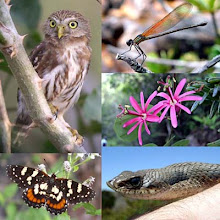I was home for
just three days after my Mato Grosso tour – just enough time to see some dear
friends, sort and open mail, and get the bulk of my post-tour chores done; but
not enough to make a trip to the laundromat. I did walk around the yard from
time to time and enjoy the hummingbirds at the feeders and migrants stopping
by.
What I
particularly enjoyed is my Mexican Passionflower, Passiflora mexicana. I have a vague memory of sowing several seeds
of this and several other natives all over the yard when I first moved here in
May of 1998, but do I recall being surprised to see this vine some three to four
years later. It’s now a fabulous, lush summer delight, growing more and more stems each
year. This year it is even putting up sucker sprouts a few feet away from the
main caudex, on the opposite side of the venerable Velvet Mesquite it uses as
its main support. It seems to have claimed this location as its permanent home.
One might
not even notice this plant except for the mid-August stench of the blooms. They
have a strange mildewey, powdered milk sort of rank, heavy smell that doesn’t
exactly you make you wretch, but you don’t seek to discover the source more
closely either. The flowers are very small for the genus but lovely
nonetheless.
Gulf
Fritillaries just barely manage to find and develop on this native. Several
years ago when this plant was still young, I planted a non-native Passiflora cerulea as a decoy to keep
them away from my native gem, and they went crazy on it, eating the stems and
all to stubs, and many caterpillars made it to adulthood. Meanwhile, this
native species only draws a couple individuals and caterpillars each year. I
found just three caterpillars on the many meters of lush growth this time.
Maybe the
smell of the flowers distract them. But it’s possible also that these pale
spots on the leaves look like eggs, discouraging the adults from laying.
Here’s an
egg from the lone butterfly that was visiting on the day I took these photos in
late August.










